A competitive funding opportunity to develop and implement accelerator programs that support small businesses and entrepreneurs commercialize ocean, coastal, and Great Lakes-based climate solutions
The focus of this funding opportunity will be to partner with and fund eligible organizations to develop business accelerators that provide specific programming and opportunities for small businesses and entrepreneurs aligned with identified marine-based climate resilience theme areas. The program will foster public-private partnerships to develop and support sustainable business models around ocean, coastal, and Great Lakes observation technologies, products, and services that address climate resilience needs.
NOAA technical assistance will be available for organizations applying for and receiving funding. NOAA will actively partner with awardees through cooperative agreements, providing scientific and management expertise.
Read frequently asked questions about this program here.
Register for the Marine Technology Society webinar series here.
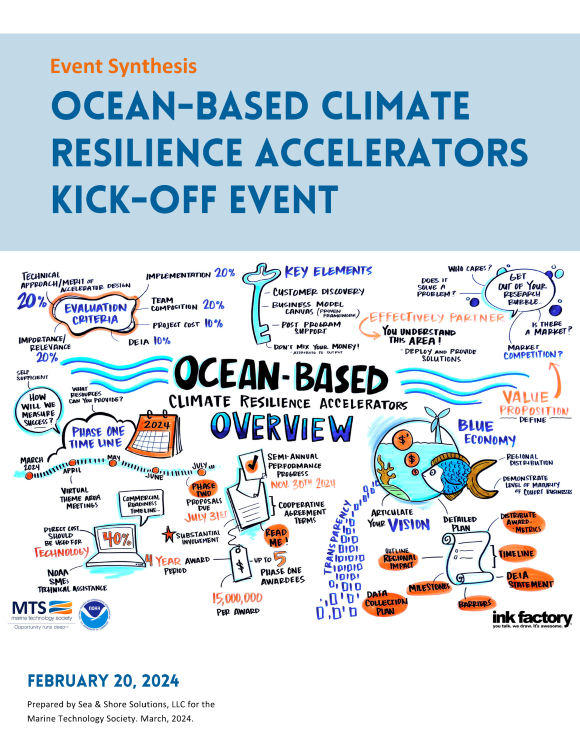 Download the Kick-off Meeting Synthesis Report here (pdf, 4.12 mb)
Download the Kick-off Meeting Synthesis Report here (pdf, 4.12 mb)
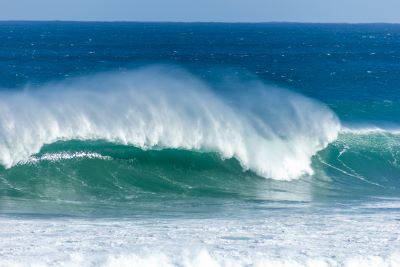
WHAT ARE ACCELERATORS?
Business accelerators are entities that support the development of innovative early- to mid-stage businesses with training, resources, mentorship, and/or funding with the aim of bringing products to market.
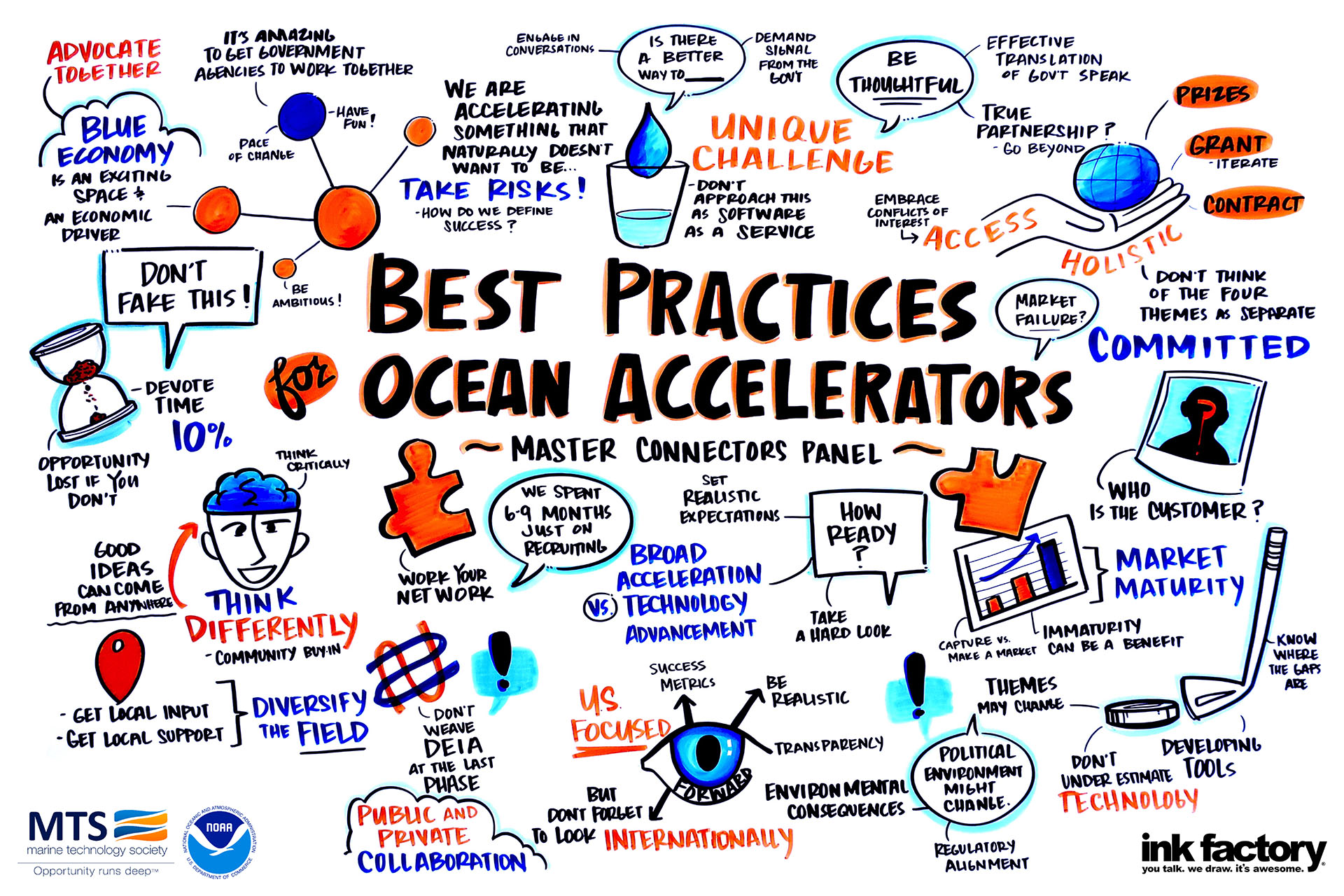
Subscribe to email updates
Ocean-Based Climate Resilience Accelerator Theme Areas
NOAA’s Ocean-Based Climate Resilience Accelerators program aims to develop and provide business accelerator services to start-ups and small businesses. The program will foster public-private partnerships to develop sustainable business models for ocean, coastal, and Great Lakes observation technologies, products, and services around four marine-based climate themes: (1) Ocean Renewable Energy; (2) Coastal and Ocean Carbon Sequestration Monitoring and Accounting; (3) Hazard Mitigation and Coastal Resilience; and (4) Ecosystems Services. While the Accelerator entities may be focused within one theme area, it is likely that the Accelerator targets will fit within multiple theme areas.
NOAA is holding discussions with federal partners, accelerator funding recipients, and private industry partners throughout the duration of the accelerator program to inform and refine the major issues, challenges, gaps, and/or problem statements facing small businesses operating in the theme areas. The outstanding gaps and scientific questions summarized below serve as a signal for driving market needs, and may help inform business development.
Developing the tools and information services to enable safe, sustainable, inclusive, and informed ocean renewable energy
Climate resilience will require the development of ocean observation technologies and information services to support the siting, construction, and operation of ocean renewable energy resources, such as offshore wind, floating solar, geothermal, and tidal and wave energy. These technologies are also necessary to support forward-looking analyses, science, and research to ensure ocean renewable energy progresses in tandem with biodiversity protection, and ocean co-use.
Driven by the national target of deploying 30 gigawatts of offshore wind energy by 2030, offshore energy presents numerous market opportunities to help address new technical challenges and understand and mitigate risk. For the purpose of NOAA Ocean-Based Climate Resilience Accelerators funding opportunity, offshore wind accelerators will: (1) focus on the predictive timescales of days-to-weeks, rather than timescales of months, years, or decades; and (2) support the development of tools and information services that enable sustainable, safe, inclusive and informed ocean energy development, rather than energy technologies themselves.
Understanding and Mitigating Impacts to Marine Ecosystems.
The growth and establishment of the offshore energy industry requires understanding and mitigating impacts to marine ecosystems, species, and fisheries.
- Technologies. New and/or improved instrumentation, sensors, and methodologies will enhance oceanic and atmospheric observations and support impact studies to better understand, predict, and mitigate impacts, such as the changing distribution, abundance, and/or species composition of marine species. For example, eDNA sensors and imagery surveys from satellite or unmanned aerial systems may be developed and deployed to catalog and quantify the species present in the surrounding area.
- Environmental Impact Studies And Stock Assessments. Robust environmental impact studies and stock assessments are needed, particularly as they relate to mitigating impacts on fisheries (including commercial, recreational, and tribal fishing), marine species (including abundance, distribution, and/or species composition), and ecosystems from the construction and operation of offshore energy systems. These studies may also inform the development of new and/or improved technologies, as well as the density and spatial resolution of sensors needed to improve future impact studies and stock assessments.
- Transdisciplinary Sampling Regime. To address the issues and questions that surround the siting, construction, and operation of ocean renewable energy resources, there is an opportunity for developing a public-private partnership where NOAA describes a transdisciplinary sampling regime to address multiple needs (e.g., replacing fisheries surveys loss; understanding noise regimes; habitat changes; and other needs) with funding and deployment done by private entities.
- Mapping Ocean Environments. Maps characterizing and representing the distribution and extent of ocean habitats are valuable tools for improving the understanding of ecosystem patterns and processes, and promoting scientifically-sound management decisions, and are largely missing. While the mapping of such environments is in itself a gap in the market, these efforts also require significant infrastructure and information systems that small business and entrepreneurs can develop and/or improve upon.
- Characterizing Energy Potential. Accurately characterizing the offshore resource (e.g., wind, wave, etc.) in terms of energy potential of the resource as well as how it will affect the offshore systems performance, maintenance, and lifespan are critical to site setting, ensuring efficient power markets, and integrating offshore power with the onshore grid. Improved models are needed to better simulate the local interactions of wind, waves, wakes, and the offshore structures. Beyond improved models, improved observations are needed across a wide set of conditions, particularly the atmospheric boundary layer—where obtaining measurements is challenging because few seaworthy platforms are available. Additionally, Quality Assurance/Quality Control (QA/QC) and data assimilation systems must be developed to ensure these data can be best used.
- Marine Energy Powered Condition Monitoring. Condition monitoring for offshore energy systems refers to the systematic process of continuously observing and analyzing the operational health of the system components in offshore environments. This involves the real-time monitoring of critical parameters (e.g., vibrations, temperature, lubrication, etc) conditions to identify potential issues before they escalate, ensuring optimal performance and preventing unplanned downtime. The development, deployment, and integration of advanced sensors, data analytics, and machine learning algorithms will enable a proactive maintenance approach to ensure the reliability and efficiency of offshore energy systems.
Dynamic line reading. An immediate short term challenge for ocean renewable energy is the transfer of offshore energy into the onshore grid. Dynamic line reading uses weather conditions to determine how much power can be pushed down a transmission line and presents a unique opportunity for accelerators to develop public-private partnerships to leverage observations and predictive systems from federal agencies to evaluate, characterize, and predict how much energy can be transmitted. Additionally, both the development and maintenance of the infrastructure required to transfer energy to the onshore grid is needed.
<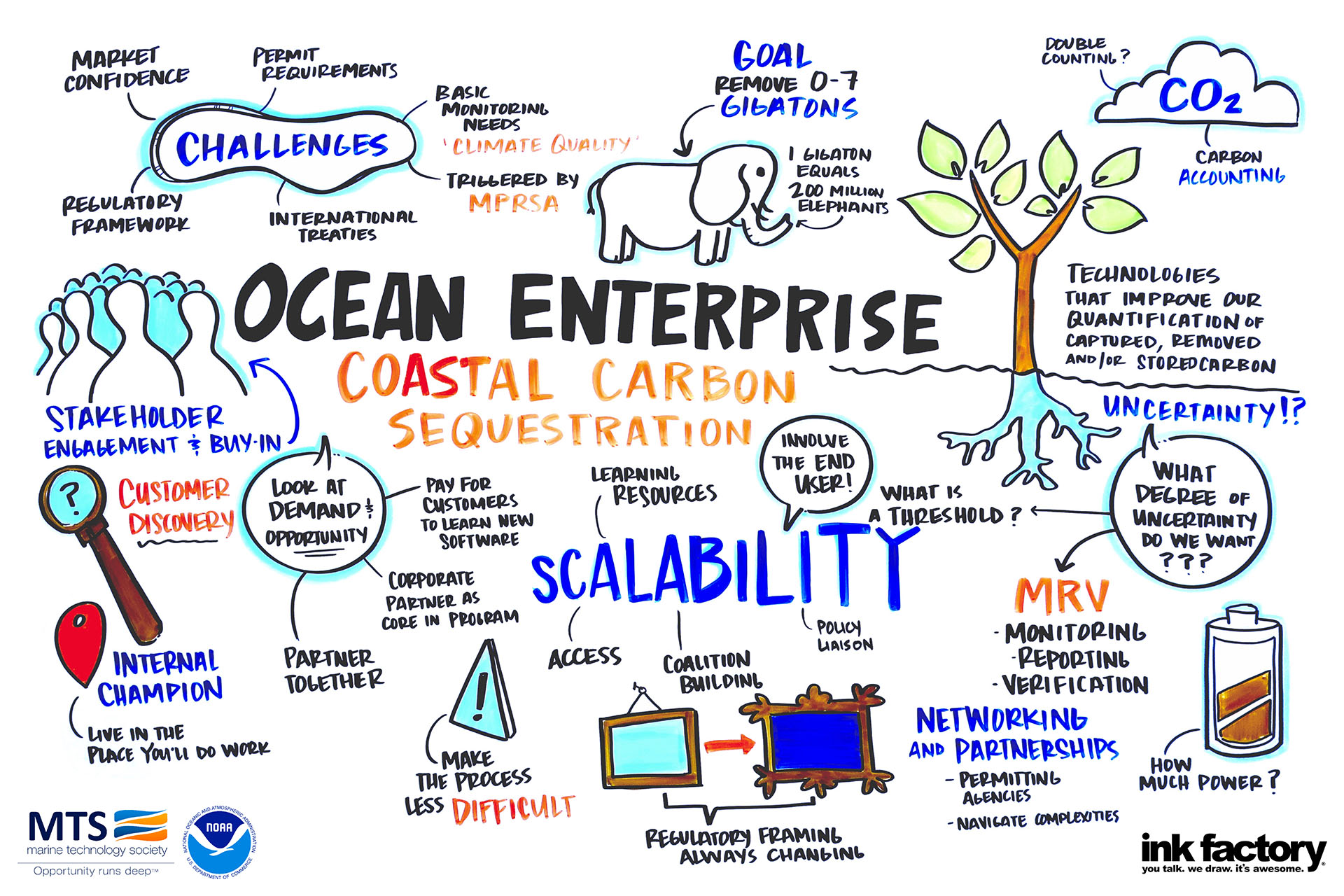
Developing the tools and information services needed to measure the effectiveness and monitor the impacts of carbon sequestration and storage
There is growing interest in enhanced natural and engineered sequestration of carbon (e.g., CO2, CH4, etc.) in the coasts and oceans. To support climate resilience as these initiatives move from pilot to large operational scale, there is a need for improved ocean observations and information services that monitor their effectiveness and environmental impact and verify and monitor the quantities of carbon they remove. For the purpose of NOAA Ocean-Based Climate Resilience Accelerators funding opportunity, this effort will support the tools and information services that can measure the effectiveness and monitor the impacts of their deployment, rather than the development of carbon sequestration technologies themselves.
- Quantification.
Technology and Infrastructure. All sequestration methodologies will demand careful quantification of the amount of carbon that is captured, removed, and/or stored. However the capacity, technology, infrastructure, translation services, data services, and modeling for effective quantification and monitoring are either not currently available or are not accessible at the scales needed. While some technologies have been successfully transferred to industry, the historically small market size has hindered investment and growth in this field. Innovative solutions, such as leveraging open source technology development and distributive manufacturing approaches, are needed to overcome this challenge. Additionally, observing systems need to be developed and deployed at the appropriate scales to assess the success of these methodologies. - Bespoke Monitoring Services. Core information streams may also be developed and used to provide bespoke monitoring services. These data and information will be critical to provide evidence for the effectiveness of methodologies and to verify and monitor the quantities of carbon being removed needed to support a viable carbon sequestration market.
Uncertainty. While it would be ideal to quantify exactly how much carbon is captured, removed, and/or stored, the different technologies, approaches, and capabilities will inevitably have different levels of data variability/uncertainty. Understanding the uncertainty around quantifying carbon capture and storage is needed, as well as understanding what the market will accept in terms of uncertainty tolerance. To better understand the offshore energy uncertainty tolerance, economics expertise could inform what the fidelity of the science system needs to be, which can be leveraged to co-develop the requirements for the entire value chain.
Carbon markets. While the interest in carbon capture and sequestration is growing, investors need to know how much carbon is stored in the various approaches to confidently trade on the carbon markets, the trading systems in which carbon credits are sold and bought. Compliance markets are created as a result of national, regional and/or international policy or regulatory requirements, while voluntary carbon markets include the issuance, buying and selling of carbon credits on a voluntary basis. For carbon markets to be successful, concerns around accurate quantification and sequestration must be addressed, transparency in the institutional and financial infrastructure for carbon market transactions must be established, and adequate social and environmental safeguards must be in place to mitigate against any adverse project impact.
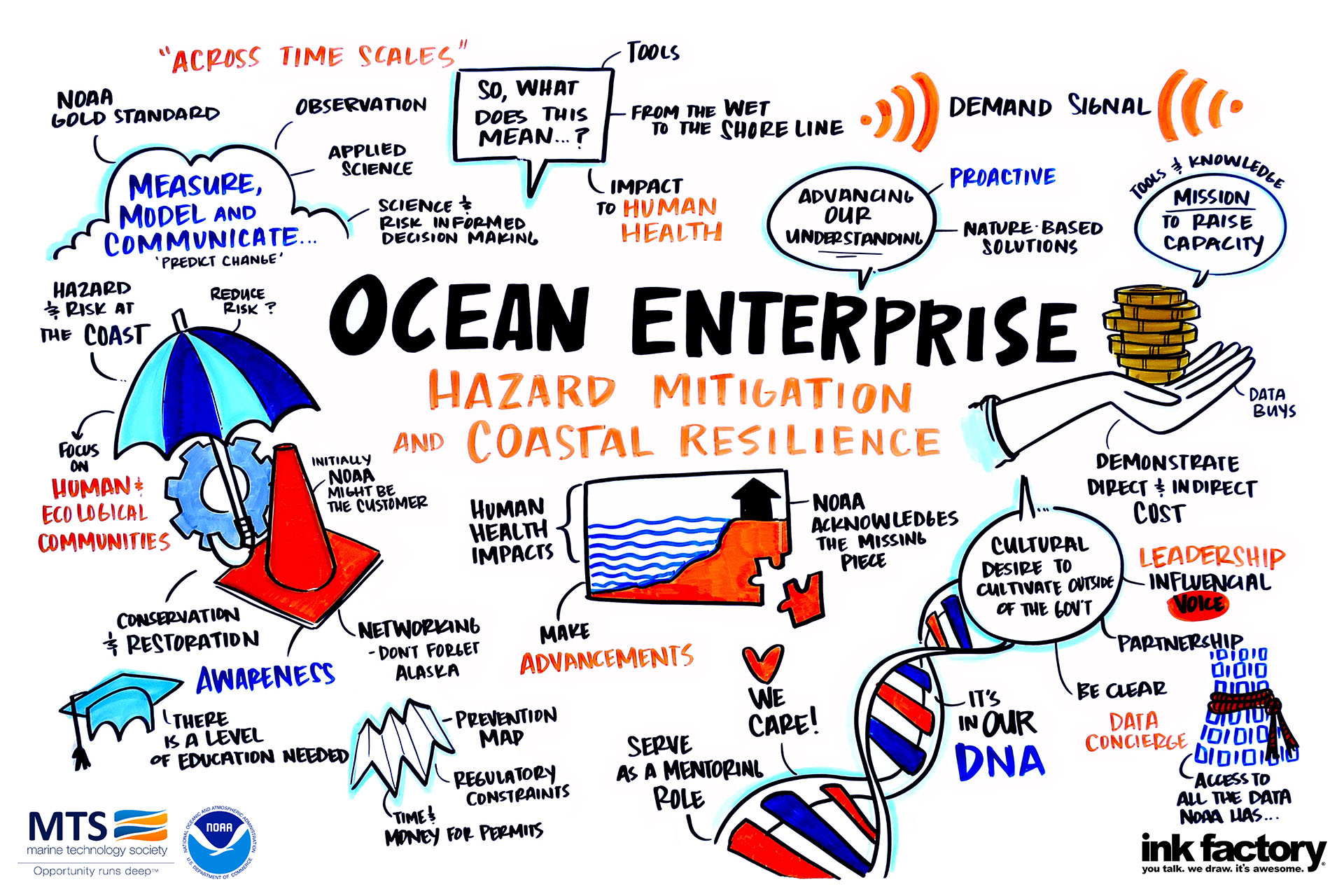
Providing high resolution, regional observations and modeling products to facilitate climate resilience in coastal communities
Coastal communities are home to more than 160 million people and generate more than half of the U.S. economic output. However, coastal areas are susceptible to a number of natural hazards—such as coastal storms, flooding, coastal erosion, tsunamis, and sea level rise—all of which are being exacerbated by climate change. These hazards threaten lives, property, infrastructure, the natural environment, and, ultimately, economies. Each year, coastal hazards result in billions of dollars in damage and associated costs, and often with lives lost. Decision makers in coastal states are all asking the same question: What decisions do we need to make today to protect our people, land, and infrastructure from these increasingly extreme hazards?
Predictions.
- Wind and Water. To facilitate climate resilience, coastal communities require accurate wind and water level models and predictions to prepare for and mitigate beach erosion, coastal flooding, and prevent loss of human life. Accurate wind-wave forecasting in enclosed or semi-enclosed basins, nearshore coastal areas, islands, and estuaries require high resolution observations and modeling at a regional scale. These regional scale observations and model products are currently not available to vulnerable coastal communities nationwide; therefore, it is not possible to accurately predict the magnitude or extent of coastal flooding during episodic storms, King Tides, and other wind- and wave-driven events.
- Wildfires. Coastal communities also increasingly need predictions and forecasts related to wildfire events, including smoke pollution. Rising temperatures, declining snowpack and frequent droughts are all leading to a dramatic surge in wildfire frequency and severity, filling skies with smoke, threatening lives and property, and impairing fresh water supplies. Improved models, predictions, and decision support are needed to inform decision makers to plan for and mitigate the impacts of wildfires.
- Wastewater. Communities also need better models and predictions related to storm impacts on wastewater. When an extreme storm is expected to make landfall, decision makers need to understand where the waste may enter the water, where it is expected to go, and how long it will persist to mitigate impacts to drinking water and human health.
Technology. The impact of climate risks in coastal communities is dependent on: (1) the types of hazard being considered; (2) the exposure communities have to particular hazards; and (3) the impact of the hazard. Each of these climate risk components would benefit from new and/or improved hardware/software/technical capabilities and could further benefit from learning from and coordinating across the components. There are market opportunities for private companies to identify coastal hazard gaps; develop and/or improve monitoring technologies to address these gaps; and gather subject matter domain experts to work together to aggregate and balance the coastal hazard risk components. Advances around this could lower the barrier to entry for understanding how these components stitch together, their interrelated dependencies, as well as improve the ability of communities and decision makers to digest the hazard risk and mitigation solutions.
Nature-based infrastructure. Nature-based solutions offer integrative strategies to reduce climate risks, while providing a range of other benefits such as climate regulation, recreation, health, tourism, food and drinking water. Currently, the lack of engineering and economic grounding for nature-based infrastructure has hindered the implementation of such nature-based projects. A wide breadth and depth of opportunities exist with: (1) designing infrastructure; (2) tracking infrastructure performance; (3) better understanding siting; and (4) quantifying the direct and indirect cost benefits.
Tools. Improved decision support tools are needed for coastal communities and decision makers to better understand and plan for climate-dependent coastal hazards. Impact visualization tools can be very powerful for communication and message delivery, and often outside of the scope of what federal agencies can develop. For example, risk assessment tools are needed to allow property owners to understand their risk today, in 5 years, and in 10 years.
Providing decision makers with the ability to adapt climate resilience efforts at meaningful spatial and temporal scales
Many decision makers, including natural resource managers, offshore operators, permitting agencies, and others, require the best available science, data, and predictions to reduce uncertainty in decision making processes. Advances in ocean and coastal observation technology, modeling, and analytics are required to accurately assess and forecast ecosystem changes, such as shifts in species location, biological production, biogeochemical regulation, and physical phenomena like marine heat waves or changes in sea level. Improved predictive capabilities will provide natural resource managers and other decision makers with the ability to adapt climate resilience efforts at meaningful spatial and temporal scales.
Boating Observing Market. Given the number of vessels on the water and gear put out everyday, the largest untapped source of coastal ocean observations is the fishing, cruise, and boating industry. The private boating industry may be leveraged to place observing technologies on these vessels to gather environmental data, with the potential to scale this opportunity and develop an incentive-driven market to support fishers, cruise liners, and boaters contributing to improved ocean, coastal, and Great Lakes observations. In particular, technologies that serve as fleet multipliers, expand area coverage, and/or shore up ship coverage for a range of species (fish, mammals, sea birds, etc) could close gaps in ocean observations.
Product resolution. Many of the coastal ocean decisions are made at very local scales, however there is a gap between the resolution of the modeling products and environmental products federal agencies provide and the local resolution where decisions are made. The extension into the local coastal space remains a challenge to address at a federal agency level without input from these localities. This gap presents an opportunity for private sector innovation to develop products and services at finer resolutions to address local needs.
Decision Support Tools. Improved decision support tools are needed for natural resource managers and other decision makers to better understand and implement climate resilience efforts at meaningful spatial and temporal scales. Many opportunities exist for the acquisition of data across sources and observing platforms, the QA/QC of data, and the creation of products and/or the integration of data across observing sources. For example, the data processing and image analysis of satellite images for species tracking is an emerging field, and the data visualization of model outputs and development of video games are market opportunities.
Ecosystem Stressors and Dynamics.
- Ecosystem Dynamics. A better understanding of marine ecosystems, and how they are predicted to change in response to climate-induced ocean changes is needed to develop solutions to mitigate these reactions.
- Ecosystem Stressors. There is a need to understand the different stressors on marine ecosystems, how they have developed, and how they interact. Many users of marine ecosystems have different priorities that are often in conflict. Thus, understanding the different ecosystem services that many different users are interested in and determining where they are in conflict is needed to understand how to better protect marine and coastal natural resources. Understanding marine ecosystems synergies and stressors is also needed to understand why degradation of ecosystems continues: What factors are leading to the degradation? What market failures are occurring? How can solutions help fix those market failures and reduce or eliminate the degradation?
News
Phase 1 Awardees
| Lead Institution | Project Title | Website Link |
|---|---|---|
| Gulf of Maine Research Inst. | OceanVista: Advancing Ocean Data for Climate Resilience | https://www.gmri.org/ |
| SeaAhead | Accelerating Climate & Ocean Resilience with Bluetech Innovation | https://www.sea-ahead.com/people |
| FedTech | FedTech Ocean-Based Climate Resiliency Accelerator | https://www.fedtech.io/ |
| University of California San Diego | StartBlue Climate Ocean Resilience Accelerator Launchpad (CORAL) | https://gilbertlab.ucsd.edu/our-team/our-team/ |
| VentureWell | VentureWell Ocean-Based Climate Resilience Accelerator | https://venturewell.org/noaa-ocean-climate-resilience-accelerator/ |
| Woods Hole Oceanographic Inst. | Accelerating Resilience: Linking Research, Industry, and the Public Across the Value Chain | https://www2.whoi.edu/staff/cclayson/ |
| Old Dominion University Research Foundation |
OpenSeas Data Accelerator |
https://ww1.odu.edu/iie/openseas/founder-note |
| Activate Global, Inc | Activate Oceans | https://www.activate.org/cortney-newell |
| Tampa Bay Wave | Catching the Blue Wave: Accelerating America's Ocean Economy | https://www.tampabaywave.org/leader/linda-olson/ |
| National Offshore Wind Research & Development Consortium | The National Ocean Renewable Power Accelerator: Ocean RePower | https://nationaloffshorewind.org/staff/lyndie-hice-dunton-ph-d/ |
| University of Hawaii | HITIDE Studio: Guiding the Commercialization Voyage of Ocean-Based Climate Resilient Technologies | https://www.fedtech.io/ |
| The Idea Village | CLIMATEx Accelerator Program | https://www.ideavillage.org/ourteam |
| Washington Maritime Blue | Maritime Blue Ventures for Ocean-based Climate Solutions | https://maritimeblue.org/our-team/ |
| Alaska Fisheries Development Foundation | Alaska Oceans 2075: Acelerating a Reilient Future | https://afdf.org/staff |
| Seaworthy Collective | The Upwell Collaborative Accelerator | https://www.seaworthycollective.com/about |
| gener8tor Management, LLC | Great Lakes Resilience Accelerator | https://www.gener8tor.com/ |
 Official websites use .gov
A .gov website belongs to an official government organization in the United States.
Official websites use .gov
A .gov website belongs to an official government organization in the United States.
 Secure .gov websites use HTTPS
A lock or https:// means you’ve safely connected to the .gov website. Share sensitive information only on official, secure websites.
Secure .gov websites use HTTPS
A lock or https:// means you’ve safely connected to the .gov website. Share sensitive information only on official, secure websites.
